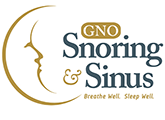Are you a snorer? Is nasal congestion at fault? While there isn’t one universal reason for snoring, a constant stuffy nose can contribute to this common problem. Take a look at what you need to know about the connection between nasal congestion and snoring and what you can do to get a good night’s rest.
Why Do You Snore?
To understand why nasal congestion can lead to snoring, you may need to learn more about why this issue happens. Snoring is the result of turbulent airflow through the upper airway during sleep. When you breathe, the air should flow freely through your nose and throat. But when obstructions or narrowing occur within this passageway, it can disrupt the smooth airflow, causing vibrations in the surrounding tissues.
Why Do You Have Nasal Congestion and Why Do You Snore?
Nasal congestion, often caused by allergies, colds, or sinus infections, narrows the nasal passages and obstructs airflow. Congestion-related inflammation, due to increased blood flow and swollen blood vessels, can decrease the space available for airflow. This makes it more likely for air to meet resistance.
Mucus buildup is another common cause of congestion. Excessive mucus production, a common symptom of congestion, can further obstruct the nasal passages. The thickened mucus can clog the airway, forcing you to breathe through your mouth.
Along with mucus buildup, mouth breathing can also lead to a stuffy nose at night. When nasal congestion reduces your ability to breathe through your nose, you’ll instinctively switch to breathing through your mouth. Mouth breathing is less effective in humidifying and filtering the air, which can lead to snoring.
If these nasal issues aren’t the culprit behind your snoring problem, it’s possible that negative pressure is. As you struggle to breathe through your congested nose, you create a negative pressure environment in your throat. This negative pressure can cause the soft tissues in your throat to collapse partially, further contributing to snoring.
Are There Other Connections Between Congestion and Snoring?
Nasal congestion can lead to snoring, but snoring can also worsen nasal congestion. Again, snoring creates a turbulent airflow, which can increase or worsen the inflammation and irritation of the nasal passage. The result is more snoring. This creates a cycle where one issue amplifies the other, leading to louder and more disruptive snoring.
How Can You Manage Nasal Congestion-Induced Snoring?
Over-the-counter nasal decongestants can provide temporary relief from congestion, allowing for easier nasal breathing. But it’s essential to use them as directed and avoid long-term reliance to prevent a “rebound” effect.
Like over-the-counter nasal decongestants, over-the-counter saline nasal sprays can help to reduce snoring. These products moisturize and clear your nasal passages, providing relief from congestion without the risk of rebound congestion associated with decongestant sprays.
If you want to try an approach that doesn’t include medication, sleep with your head slightly elevated. This can reduce the chances of snoring. You can use extra pillows or invest in an adjustable bed to achieve the desired elevation.
At-home or over-the-counter options do not always treat the problem of congestion or snoring. If you can’t find relief, consult a healthcare professional. They can diagnose and treat underlying conditions contributing to your congestion and snoring.
You may need a sleep study to learn more about the specific causes of your snoring or allergy and other tests to determine why you have constant congestion. Common prescription treatments for snoring include custom-made oral appliances and continuous positive airway pressure (CPAP) machines.
Do you want to learn more about why you snore and how to treat this condition? Contact GNO Snoring & Sinus for more information.

